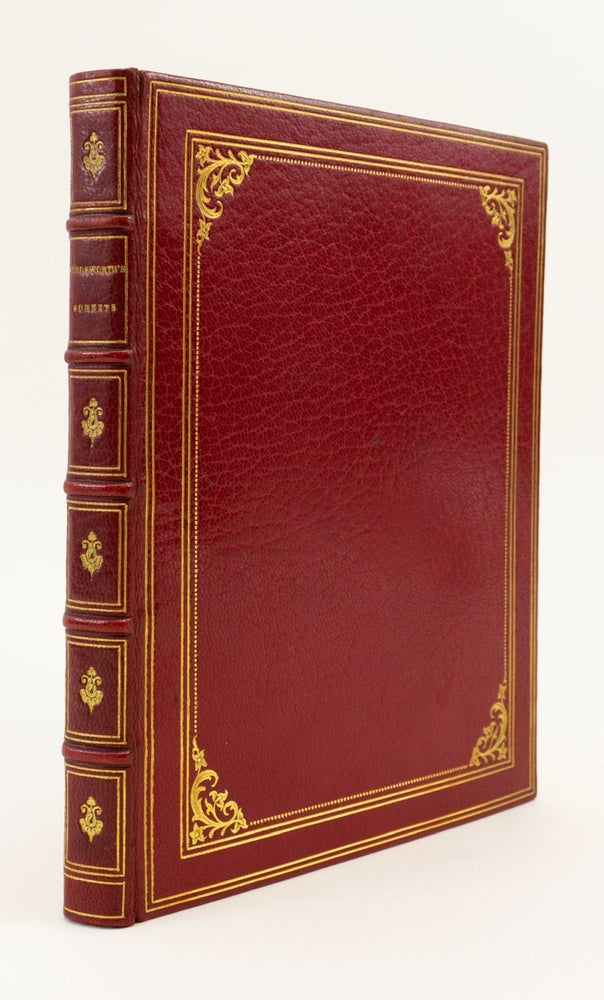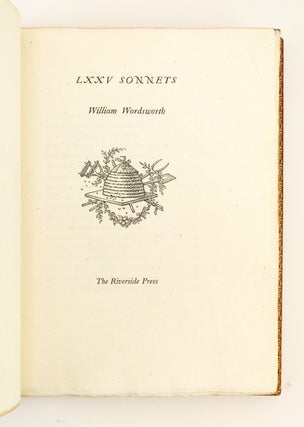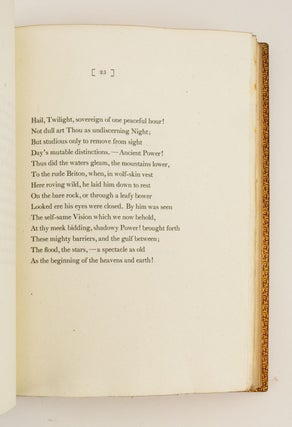LXXV SONNETS.
(Cambridge: Riverside Press, 1910). 215 x 160 mm. (8 1/2 x 6 3/8"). 5 p.l., 24, [1], 25-48, [1], 49-75, [1] leaves, printed on recto only. No. 114 OF 440 COPIES.
LOVELY SCARLET CRUSHED MOROCCO, GILT, BY THE ROWFANT BINDERY (stamp-signed on front turn-in), covers with double gilt fillet frame, flower and acanthus leaf cornerpieces connected by dotted rule, raised bands, spine gilt in double-ruled compartments with fleuron centerpiece, gilt titling, densely gilt turn-ins, marbled endpapers, top edge gilt, other edges untrimmed. Title page with beehive device. A Large Paper Copy. Front pastedown with bookplate of Ben Zevin. Warde 103. ◆Spine an evenly darker shade of red, otherwise A VERY FINE COPY--clean, fresh, and bright internally with immense margins, in a lustrous binding with no signs of wear.
This handsome collection of 75 Wordsworth sonnets is a wonderful example of American fine printing and binding--a volume designed by Bruce Rogers and printed at the Riverside Press limited editions division, then bound by the expert artisans of the Rowfant Bindery. When the Club Bindery established by members of the Grolier Club closed its doors, binders Henri Hardy and Leon Maillard were lured to Cleveland to helm the bindery of the Rowfant Club, continuing to provide American collectors with bindings as beautifully executed as those in the great ateliers of Paris and London. Hardy, who had apprenticed with the French master Charles Meunier, was a talented binder, but it was the moody and difficult Maillard, considered the finest finisher of his generation, who took the bindery's creations from merely pretty to spectacular. The Rowfant Bindery operated from 1909 to 1913. After its closure due to financial difficulties, Hardy and his brother-in-law Gaston Pilon set up the Booklover's Shop, where they continued their trade until 1918, when Frank Doubleday hired them to head the French Bindery in New Jersey. Hardy continued to work there until his retirement in 1933, winning ever-wider acclaim and notable awards, including the Ordre des Palmes Académiques. The brilliant but troubled Maillard had no such happy ending, unfortunately. Although he, too, was recruited by Doubleday, personal problems overwhelmed him. Reduced to selling carpet sweepers, he committed suicide in 1921.
The Indiana-born Rogers (1870-1957) was one of the leaders of the American typographic renaissance in the early 20th century. According to Blumenthal, "his greatness lay in the felicity of his brilliant manipulation of type and ornament, in his command of all the basic processes and their consummation in beautiful books--noble books that can be read with pleasure and owned with pride--not objets d'art to be stored behind glass." He was hired by George Mifflin of Houghton, Mifflin to work at the Riverside Press, and in 1900 was given free rein to design and print books for their limited-editions department. Over the next 12 years, "he produced more than 100 Riverside Press editions, which are still highly esteemed and valued," according to Britannica.
In addition to being head of a major American publishing house, Cleveland's World Publishing Company, Ben Zevin (1901-84) was a bibliophile who admired Rogers' work very much. In 1949, he delivered a speech at the Rowfant Club on Rogers' masterpiece, the Oxford Bible. Founded in 1892 for men interested in "the critical study of books in their various capacities to please the mind of man," the Rowfant Club was named for the Sussex home of leading English book collector Frederick Locker-Lampson (1821-95). (ST16703)
Price: $2,500.00



